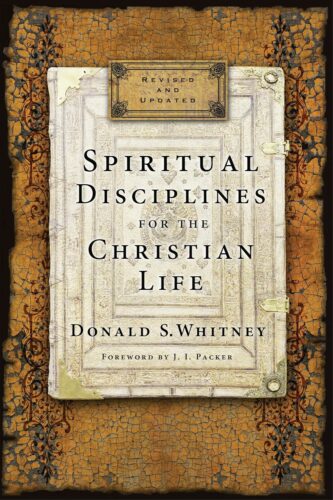 How to Understand and Adopt Spiritual Disciplines
How to Understand and Adopt Spiritual Disciplines
Author: Donald S. Whitney
I discovered Donald S. Whitney’s Spiritual Disciplines for the Christian Life through a C.S. Lewis Fellowship assignment; the assignment was to read only two chapters, focusing on the importance of reading and meditating on scripture, yet I stayed for the entire book. And I am very glad that I did.
Spiritual Disciplines for the Christian Life is a fantastic, if not comprehensive, look at several key spiritual disciplines that help to focus and improve the Christian’s devotional life. These disciplines include scripture reading, prayer, worship, scripture meditation, evangelism, serving, stewardship (focused on time and money), scripture application, fasting, silence and solitude, journaling, and continual learning. Whitney is focused on the ground level, first-time approach with three high-level themes: 1) a definition of the discipline, 2) a “why” for the discipline, and 3), some guidelines on how to get started applying that discipline.
Whitney alternately hit my guilt and devotional buttons, making this both a hard and a good read. Admittedly, I wanted to resist some of the things he said. They’re work, hard work, and Whitney does not shy away from this. Yet, he addresses the freedom of Christianity and explains that although some of these disciplines seem to smack of legalism, learning to discipline ourselves is actually the outlet to true freedom, which I do agree with. Mind you, I wouldn’t have minded a little lighter touch, since I don’t feel that all these disciplines are equal. For example, Jesus mentions fasting, prayer, worship, etc. and it is obvious that these are requirements for a Christian, although there is open interpretation and freedom allowed in the execution. Journaling though?? Ehhhhhh…. Still, Whitney did make a good case for why journaling is helpful. The real problem is I just don’t want to do it, but his arguments stand, powerful, compelling, enough to break down my initial barriers and make me really think. It’s both uncomfortable and uplifting, if a bit scary.
There are, of course, other disciplines that are not mentioned: community, confession, forgiveness, mercy, patience, etc. I’m a little curious as to why Whitney only chose some disciplines to focus on, while others do not even get a mention. Part of that is that the disciplines he focuses on are more Protestant focused, and part of it, I’m sure, is the requirements of a written work. You can’t cover everything and some disciplines, like patience, are harder to practice in an ordered way.
What Whitney does cover is well though out. He does an excellent job explaining what each of the disciplines are and then backing them up with Biblical references in the life of Jesus, as well as the apostles and early church. Likewise, Whitney shows what the spiritual fruits are for each discipline and why they are worth the time and effort. For me, these definitions were the most compelling part of the argument. Whitney argues that we make time in our lives for what matters, but not for God. This is true, and while not all of Whitney’s suggestions for implementation worked for me, I was able to see the focus behind the message and customize the recommendations to my own needs. For example, my daily scripture reading is really listening done through Audible, which means that I cannot say “I don’t have time,” because even while working or cleaning the house I can always listen.
And actually, I was quite inspired. I dislike (ok, hate) memorization and had been ignoring this, despite its requirements as part of the C.S. Lewis Fellowship program, but Whitney finally convinced me of the importance and I buckled down and learned my verse for this month. I also did something I was sure I would never do. I tried a fast. I’ve always looked at fasting as antiquated, purely Old Testament stuff, but then Whitney went beyond the description to show the reasons and the fruit from such a work. When I tried it for myself, I found his advice to be correct. I’ll be fasting again.
Will I do everything in this book? Probably not, at least not all at once. But I’ve already adopted some of the disciplines and thought of ways to enhance the others. I thought that the sections on prayer and scripture were especially inspiring and moving. I also found Whitney’s approach to evangelism, something I have a lot of questions about, well thought out and realistic. If someone personally came to me from nowhere and started preaching to me on anything, even if it was something I believed, I would resist it. We’re in a world with enough “sales.” Whitney acknowledges this and approaches evangelism more in a practical way: how you live your life, how you answer questions, how you respond to those near you, etc. This is something I can see myself trying, something I can see God in.
All in all, this is a very moving and wise book and a great place to start. Often in our world of instant gratification, we’ve lost sight of the benefits and freedom of discipline. We want to move closer to God but aren’t sure how to do it. Like anything that really matters to us, the initiative of deepening our relationship with God requires discipline, requires forethought, requires approaching His majesty with reverence, and it requires sacrifices. Highly recommended.
– Frances Carden
Follow my reviews on Twitter at: https://twitter.com/xombie_mistress
Follow my reviews on Facebook at: https://www.facebook.com/FrancesReviews
- Book Vs Movie: The Shining - April 6, 2020
- Thankful For Great Cozy Mysteries - December 13, 2019
- Cozy Mysteries for a Perfect Fall - October 20, 2019


